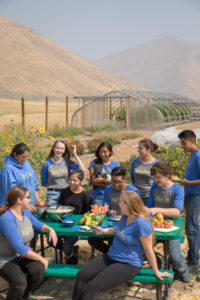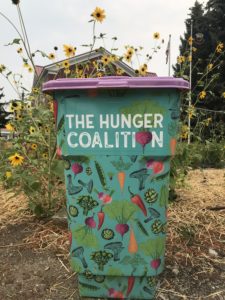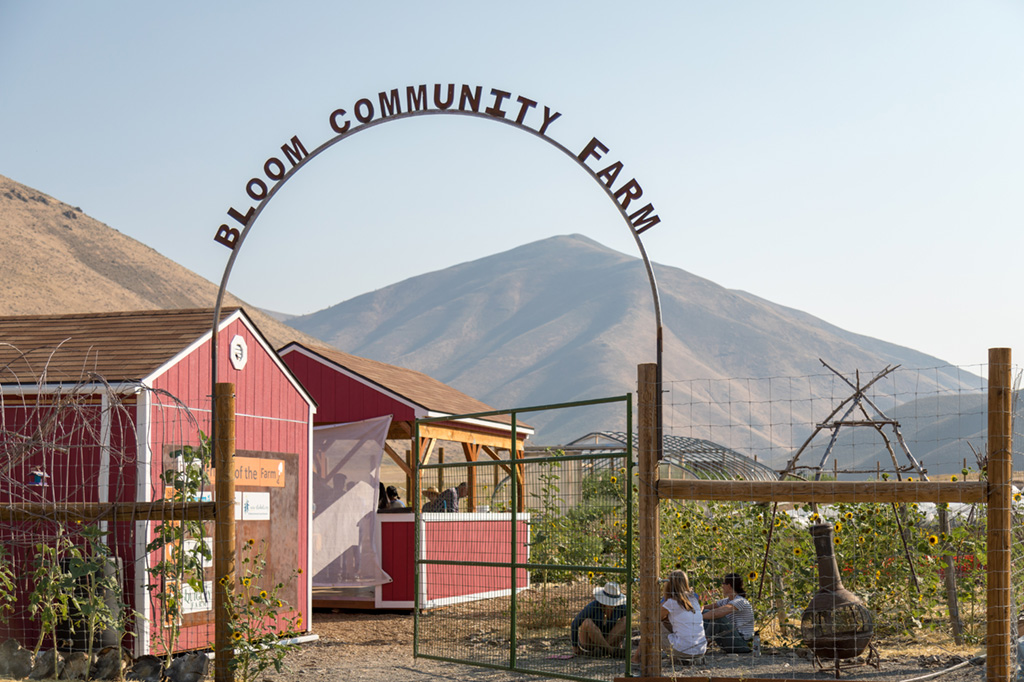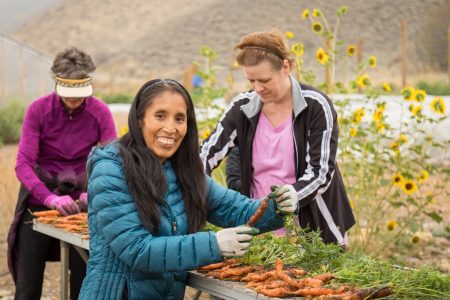“Good food inspires joy, togetherness, growth, health, strength, and the courage to make a difference. The Hunger Coalition believes everyone has the right to good food.”
These are the words displayed prominently across the home page of The Hunger Coalition’s website, an organization dedicated to making radical change with regard to food security in Blaine County. Through their food pantry, numerous programs for children, families, and infants, and the recent addition of Bloom programs, The Hunger Coalition tackles the often-underestimated level of food insecurity present in Blaine County.
Founded in 2003 by Tom Iselin, The Hunger Coalition began as a small group of volunteers collecting and distributing food to families. Over time, it developed a food pantry based in Bellevue, and, by 2015, the organization had grown to include three weekly food distributions, 12 full-time staff members (which grew to 14 in 2019) and numerous programs.
Programs and resources provided by The Hunger Coalition include its food pantry, Paws for Hunger, a partnership with Mountain Humane to help families facing financial difficulty to feed their pets, and Double Up Bucks, a collaboration with The Hunger Coalition and the Wood River Farmers’ Market where SNAP (food stamp) recipients can double their buying power (for instance, if you spend $20 on your SNAP card, you’ll get $40 to spend at the market). Various food programs to provide children with food include Daily Bites and Snack Packs during the school year and the Summer Food Program for children in the summer. The Infant Formula Initiative ensures babies who require supplemental nutrition get formula every month of their first year. The Hunger Coalition even provides a cooking and nutrition class for adults and for teens and a women’s group.
Despite all of these amazing programs and initiatives launched by the Coalition in its 16 years of existence, members realized that the root causes of hunger weren’t being addressed; rather, symptoms of the causes were simply being resolved. In order to better understand the big picture of hunger in Blaine County, the Coalition conducted a Community Food Assessment (CFA), which revealed that stigma was the primary barrier preventing people from reaching out for food when they needed it most. Even though the Coalition knew that 19 percent of the county was accessing their food services, a United Way report uncovered that a staggering 35 percent of Blaine County was food insecure or one crisis away from it.
Based on this report, the Hunger Coalition pivoted to add some programs that would have less stigma attached to them. “A lot of what we do now is largely to address and alleviate some of the stigma that has historically been tied to food assistance,” said Kristin McMahon, Communications and Development Supervisor for The Hunger Coalition. “We’re trying to address why there’s such a gap of people not accessing our services when we’re available for everyone.”
McMahon went on to explain that this was the impetus for the Bloom Program, which launched in 2016 and includes the Bloom Farm, Bloom Truck, Bloom Youth Project, Volunteer for Veggies, and a stronger Summer Food Program. The Bloom Community Farm, located in Quigley Canyon via Fox Acres Road, and the Hope Garden, located in Hailey next to the Blaine County Courthouse, offer the Volunteer for Veggies program, which lets volunteers farm and garden in exchange for a share of fresh, local produce harvested on site.

Interns at the Bloom Community Farm grow food, cook meals, and run a mobile market.
Lynea Petty, Food Production Manager at The Hunger Coalition explained: “One of the main reasons we built the farm is to increase food access in a non-stigmatized way through Volunteer for Veggies. We saw this concept in places around the country where people can work in exchange for the fresh veggies they’ve just harvested.”
Petty has found that the program is working across the board to decrease stigma with everyone from 2-month-olds to 80-year-old retirees to people of all ethnicities coming out to the farm. “It’s exactly what we hoped it would be, a community farm that attracts everyone,” Petty said.
In summer and fall, the Coalition’s fresh food markets also sell the bounty of both the Bloom Farm and the Hope Garden. The Bloom Youth Project allows local teenagers the chance at a seven-month, paid internship using Bloom Community Farm as a platform. The interns grow food, cook meals, run a mobile market, and more. “There are workshops all the time where they learn money management, how to cook, interpersonal communication skills, and how to set goals,” Petty said.
The Bloom Truck, launched in 2016 as part of the Bloom Program, is a partnership with the Community Library to bring food and books into neighborhoods in Blaine County communities via the food truck. Additionally, every week different nonprofits and businesses come out with an activity for kids such as a bike repair workshop through retailer Sturtevants or an art class through the Sun Valley Center for the Arts. “It’s a collective effort to tackle some of these pressing problems,” McMahon said.
In another effort to make the organization more accessible, the Hunger Coalition did a brand makeover last summer that included changing its logos and modifying their messaging in a way that talks differently about hunger and the people affected. “We’re trying to bring a lot more awareness,” McMahon said. “People know the glitz and glamour of Sun Valley, but we have such a severe wealth disparity as well as very high food costs and low wages, which drives these problems.” Indeed, in an article

from the Idaho Statesman, Blaine County was cited as the 27th highest in terms of wealth inequality. The Hailey area was ranked ninth. A 2018 report based on the U.S. Bureau of Labor statistics also cited Idaho as 10th in a list of states with the lowest wages in the country.
For now, McMahon said, “We’re working on really excelling in our current programs and also trying to dream up the futureand how we can better address the problem of food insecurity more holistically.”
The future might involve a variety of partnerships and new ideas for Blaine County, but, for now, The Hunger Coalition simply strives to get more people using the resources already available.
“We aspire for a more food-just Blaine County; that’s where our conver-sations are leading right now,” McMahon said.



